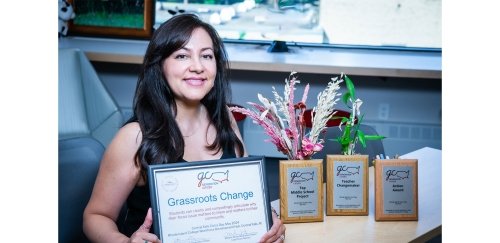
Diana Ortega-Oliveira’s passion for teaching languages is helping her motivate and inspire young people.
Diana Ortega-Oliveira ’25 is a former bilingual paralegal who decided to teach languages after starting a family. She holds an M.A.T. in world languages education from Rhode Island College and taught in the Dual Language Spanish program at Raíces Upper Dual Language Academy and Calcutt Middle School in Central Falls from 2023 to 2025. This fall, she begins teaching Spanish at North Attleborough High School.
Originally from Colombia, Ortega-Oliveira moved to the United States at age 12 and became a multilingual language learner (MLL), just like many of her students now. After finishing high school, she returned to Colombia to pursue a career as a lawyer, like her father. However, due to safety concerns and the loss of a family member, she decided to move back to Rhode Island and eventually enrolled in the Paralegal Studies Program at Roger Williams University.
After more than 20 years working as a paralegal, helping clients understand the law and interpreting for those who did not speak English, Ortega-Oliveira discovered her real passion for teaching. This prompted her to find a job as a substitute teacher, where she learned that storytelling and translanguaging – the practice of bilingual or multilingual individuals using their entire language repertoire to communicate – were things she truly enjoyed doing with the students.
“I love teaching social studies through stories and having a bilingual environment in class, utilizing English and Spanish constantly,” she says. “I also love talking to people, whether adults or children. Both my paralegal and education experiences have allowed me to do this and learn from them.”
When students go to the next grade, they continue in a bilingual program offered by public schools in Rhode Island.
For Ortega-Oliveira, transitioning into teaching is a deeply personal decision that involves adopting a new lifestyle and considering various personal and professional aspects.
“Being a teacher requires a lot of patience and dedication. You need to be interested in learning, recognize your strengths and qualities, what you enjoy doing, who you want to connect with and what you can contribute,” she says. “At the legal office, as in the classroom, we all have to work together and stay in sync. Adapting to all the new rules and the curriculum is crucial, but most importantly, it’s finding cultural connections with your students. In my case, being an immigrant myself helps me relate to them, because they or their ancestors were, at some point, immigrants too.”
Ortega-Oliveira says that her time and professors at RIC, especially those she identified with, had an enormous impact on her.
“I admire and respect Professor Papa for all she does on campus, especially her support for the multilingual community,” says Ortega-Oliveira. “All my other professors were great, as well. I enjoyed Professor Ender’s classes and conversations. Also, Professor González. I was very pleased to see Hispanic professors in front of the classroom. I’d never had a Latino teacher until I was at RIC. I suddenly saw myself reflected in them.”
Adjunct faculty member Monique Jacob applauds Ortega-Oliveira’s work and commitment. “Diana does more collaborative learning than most. Her students are used to working together and her projects are appropriately challenging and engaging,” says Jacob. “She creates lessons that address language expectations and instruct on history and current events in Spanish-speaking countries.”
For the 2024 and 2025 academic years, under Ortega-Oliveira’s guidance, her students – grades eight through twelve – participated in the Generation Citizen research project at the district level, winning first place. That experience, she says, showed her that changing careers was the right choice.
“My children from Calcutt School won the Overall Class and a first place for being well-articulated. My children from Raices won an Action Award,” she says. “For them, it was a total surprise. You could hear them say, ‘Look, this is the best experience I’ve ever had.’”
For their research projects, her students took the initiative to call politicians and ask questions about their proposed laws and learn about their responsibilities.
“I was very excited to see how this project boosted my children’s confidence. They were children with low confidence, who would hang their heads and say things too softly when talking to others,” she says. “It was all a team effort. Although my children did not receive an individual medal, when they took their picture with the governor, they felt recognized. That recognition and the applause were the best things that had happened to them.”
Ortega-Oliveira also received the 2025 Teacher Changemaker Award.
“That award made me realize that I am doing something right. That I am not bad at this,” she says. “However, seeing my students thrive and come out of their shells is better than anything I could have received from anyone else.”
Learn more about the M.A.T. in World Languages Program.
